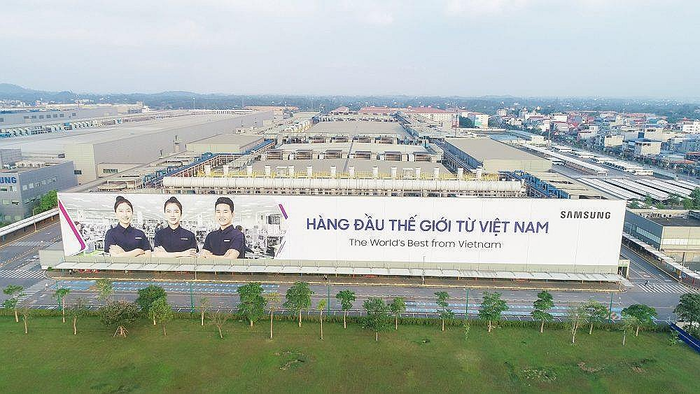President Donald Trump’s announcement of a sweeping 46% retaliatory tariff on Vietnamese exports has sent shockwaves through Vietnam’s economic landscape, with major foreign direct investment (FDI) enterprises such as Samsung, Intel, and Apple’s supply partners facing unprecedented challenges. The move is widely seen as a bid to rebalance America’s trade deficit with Asia - and Vietnam is squarely in the crosshairs.
FDI electronics manufacturers on high alert
Vietnam’s position as a global electronics manufacturing hub means the new tariff could hit hard. Samsung Electronics, which operates mega-factories in Bac Ninh and Thai Nguyen, producing up to 10 million smartphones and tablets per month, is at risk of losing a significant competitive edge.
In 2023, Samsung Vietnam contributed $55.7 billion in export turnover, accounting for 16% of Vietnam’s total exports. Customs data shows that in 2024, Vietnam exported $23.3 billion in computers and accessories and $9.8 billion in phones and components to the U.S. - a significant chunk of which could now be taxed at 46%.
This sudden tax hike is likely to inflate retail prices of key products such as Galaxy smartphones, putting them at a disadvantage against rivals from India and Thailand, which currently face lower or no tariffs.
The tariff doesn’t just hit Samsung Electronics. Affiliates like Samsung Display, Samsung Electro-Mechanics, and Samsung SDI - all operating plants in Vietnam - are now navigating serious operational risks.
Intel, Amkor, Apple suppliers also feel the heat
Ho Chi Minh City is home to Intel’s largest chip assembly and testing facility globally. By mid-2025, Intel expects to reach a cumulative export value of $100 billion from Vietnam over 19 years. However, the new tariffs could significantly reduce Intel’s cost advantages, especially if chip prices are forced upward.
Amkor Technology, which began operations in Bac Ninh in late 2024, primarily serves semiconductor giants like Qualcomm and NVIDIA. The tariff could disrupt incoming orders, potentially slowing growth and production.
Apple, while not directly owning factories in Vietnam, maintains a strong manufacturing presence through its partners like Foxconn and Luxshare. According to The New York Times, Vietnamese factories accounted for over 10% of Apple’s global supplier base in 2023. As a result, the iPhone maker may feel downstream impacts, even if indirectly.
Other major players including HP, Dell, Goertek, and others may also be affected, especially in the short term - where rising product prices, order cuts, and shrinking profit margins are imminent concerns.
Strategic reconsideration likely on the horizon
The longer-term implications could be even more significant. Companies may revisit their investment strategies, with some potentially relocating part of their manufacturing operations to other countries less affected by U.S. tariffs.
This wouldn’t be the first time global tech firms have had to respond to protectionist trade policies. During the U.S.–China trade conflict, for example, Apple and Foxconn shifted parts of their production away from China to Vietnam and India.
Vietnam’s Ministry of Industry and Trade has already outlined new export market expansion plans, targeting promising destinations such as Hungary, Poland, the Czech Republic, Slovakia, Latin America, the Middle East, and Africa. Officials have also urged Vietnamese exporters to maximize the benefits of free trade agreements and improve their defense against non-tariff barriers and technical trade restrictions.
Government moves swiftly to coordinate response
On April 3, Prime Minister Pham Minh Chinh convened an emergency meeting with the Government Standing Committee and relevant ministries to assess both immediate and long-term strategies. As a result, a Rapid Response Task Force was established, led by Deputy Prime Minister Bui Thanh Son. Deputy Prime Minister Ho Duc Phoc has been assigned to lead stakeholder consultations, including with major export enterprises.
The government's goal is to minimize the fallout and ensure Vietnam remains a stable, attractive investment destination, even in the face of mounting global trade headwinds.
Du Lam
